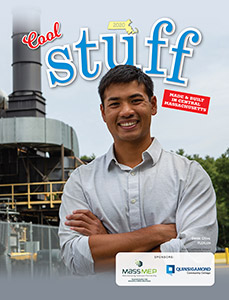
Ron “Child labor laws are killing this country” Swanson became independently wealthy by working at a manufacturing facility at a young age, investing heavily in gold and preferring to make his own items instead of buying what he needs.
Pop culture’s portrayal of manufacturing has evolved over the decades, although still not positively
Despite a greater focus on entrepreneurs, modern entertainment hasn’t quite caught up with a realistic concept of the American manufacturing workplace and its advancements.
Instead of the 20- and 40-year old portrayals of manufacturing as dirty and life-threatening industry, today television and movies will show characters who led successful lives because of manufacturing, although the industry is still more likely to be a punchline or word of warning.
And that may be part of the problem when it comes to a labor gap and misconceptions.
“I thought of it as standing in a line making things repetitively all day,” said Nate Bowen, 23, of Burrillville, R.I., who had a less-than-positive impression before he began work at Worcester custom glass maker Modern Manufacturing.
Dreams won’t come true
In the 1993 film “Rudy,” a biographical movie about motivational speaker Rudy Ruettiger, who played football at Notre Dame, factories are depicted as dirty and dangerous.
Manufacturing in a steel mill — complete with sweaty welders — is framed as employment to rise up from, not to keep or advance within. In the movie, the Rudy’s friend dies in a factory accident, helping to perpetuate manufacturing work as unsafe.
Throughout the entire movie — even in its tag line: “When people say dreams don’t come true, tell them about Rudy” — Rudy’s life is said to be unfulfilled unless he gets away from the dead-end life of a manufacturing worker.
The 1978 movie “The Deer Hunter” shows friends played by Robert De Niro and Christopher Walken as living and working in an industrial Pennsylvania town. Even though the movie is more of criticism of the Vietnam War, but the industrial town is shown to be dirty.
Even in the 2002 movie “8 Mile,” the character played by the rapper Eminem must use his talent to arise from poor manufacturing conditions. His love interest in the movie even nicknames his factory job “Dead-end Stamping.”
“Perceptions are still out there that [a manufacturing facility] is a dirty, grimy place,” said Lee Duerden, coordinator of the manufacturing technology program at Quinsigamond Community College in Worcester. “But equipment needs to be clean and maintained, floors kept swept and dry. It’s a [green], modern industry.”

Lee Duerden, of Quinsigamond Community College, said the perceptions of the manufacturing industry still align with 30-year-old pop culture portrayals.
Showcasing the moneymakers
More current portrayals of the manufacturing industry tend to focus more on individuals, characters who lead either middle-class lives or have found some fortune as a result of working for or founding a manufacturing company. Still, the portrayals tend to be less than positive.
“Family Guy” first aired in 1999 — focusing on another working-class family — with protagonist Peter Griffin employed as a safety inspector at a toy company for a time, and then at a brewery.
On the positive side, he is a homeowner, in what looks like a nice (cartoon) neighborhood, with a wife, three children and a wise-cracking dog. The Happy-Go-Lucky Toy Factory, however, is owned by a cigarette company. It released extremely dangerous toys — on the unskilled Peter’s watch, of course — with things like razor blades inside, causing damage to its reputation.
In a later episode, Peter finds a video he made as a teenager where he considers the dead-end jobs he doesn’t plan on working, manufacturing among them.
In 2008, AMC debuted “Breaking Bad” about a teacher who founds a manufacturing company after being diagnosed with cancer.
The character, Walter White, was quite successful in using his technical chemistry abilities and business acumen to eventually make tens of millions of dollars for his family. However, the manufacturing company he founded was an illegal meth-making operating, and Walter was directly and indirectly responsible for the deaths of hundreds of people.
Eventually devolving into a megalomaniac, Walter ended up destroying everything he and his family held dear in their lives, and he died — friendless and alone — after being shot by his own gun.
In 2014, “Portlandia” did a skit called “Reverse Sweatshop” loaded with satire about an American clothing manufacturing operation run out of a home basement.

Peter Griffin from “Family Guy” uses his manufacturing salary to live in a nice Rhode Island community, although his dumb-guy antics often perpetuate problems at his less-than-reputable employer.

Walter White actually founded two multi-million dollar manufacturing companies based on his own scientific prowess, but the second was an illegal meth-cooking business. He eventually devolved into a meglomaniac, was directly and indirectly responsible for the deaths of hundreds of people and destroyed everything he and his family held dear.

Jay Pritchett (center) from “Modern Family” built a closet manufacturing business from the ground up and uses his riches to take expensive vacations, buy jewelry for his much younger wife and live in an upscale mansion in Southern California.
The couple at the start of the skit wanted clothing that was made with good labor practices, but the working conditions at their home clothing company gradually deteriorate — shop employees look bedraggled and ask for water — the workload increases, and the work space gets more and more crowded.
The irony is that the clothing is made in Portland, Ore., but sold in Macau, China. The final scene shows a couple in Macau buying an item with its “Made in Portland, Oregon” tag, because the woman heard they have good labor practices.
“The fact that there isn’t anything current is problematic,” in regard to positive modern programming, said Toby Bergstrom, director of the Haas Technical Education Center at Worcester Polytechnic Institute.

Toby Bergstrom, director of the technical education center at Worcester Polytechnic Institute, tries to showcase manufacturing as a high-tech, clean profession where people can put their minds to work.
Lost in translation
According to Bergstrom and others, Central Mass. has ample resources to train the up-and-coming workforce, but interest could be stronger.
These long-standing impressions about manufacturing likely play a role, he said.
“There have been times where we have had money to run the class — and don’t have enough signups,” Bergstrom said of the advanced CNC training program WPI runs in partnership with Massachusetts Manufacturing Extension Partnership (MassMEP).
The best portrayals
The most recent positive portrayals of manufacturing come from characters Ron Swanson from “Parks & Recreation” and Jay Pritchett of “Modern Family.”
In “Parks & Recreation,” which debuted in 2009 and went off the air last year, Ron is an independently wealthy woodworker who uses his free time to delight in his favorite causes.
However, Ron is wealthy because he began working at age 11 – famously saying “Child labor laws are ruining this country” – and refuses to spend any money, preferring to make things. And his favorite cause is taking down the government from the inside, working as the parks director in an attempt to put an end to government spending.
Also in “Parks & Recreation,” the main company in town is candymaker Sweetums, which is often shown as an evil corporation seeking to take advantage of obesity and playing politics in town in order to push its agenda.
In “Modern Family,” which first aired in 2009 and is still running, patriarch Jay Pritchett is wealthy because he runs a closet making company.
Although the show rarely shows him in the work setting, this largely positive portrayal says he built the company from the ground up, married a woman about 30 years younger than him, and uses his wealth to provide a comfortable life for himself and his family.
Later in the series, Jay even brings his daughter Claire Dunphy into his business, with her eventually taking over as its CEO.

Claire Dunphy (right) from “Modern Family” took over her father’s manufacturing business, and her new power briefly turned her into a scotch-drinking-and-cigar-smoking elitist.
“We need more work in that regard,” said Cathy Phillips, co-owner of Phillips Precision in Boylston, a machine shop that provides precision tuning, prototype printing and other services. “There needs to be a much greater awareness. Younger people need to see [manufacturing] as a viable option.”
Real-life reality
Bowen said after he started working at Modern Manufacturing his perception of the industry has changed. He reluctantly came in for an interview this past February, with no experience, and began as an installer’s apprentice. But owner Rick Uras saw potential: Bowen is now working in the office — on track to be a project manager — and is studying CAD online.
“There is a lot more to [manufacturing] than I expected … It has given me so much opportunity, more than I would have thought,” Bowen said. “I had no idea where it would take me.” ◾

Nate Bowen, 23, of Worcester firm Modern Manufacturing, said his perception of the industry used to match the typical stereotypes.
Manufacturing is third best paying industry in Worcester County
Source: U.S. Bureau of Labor Statistics| Engineering occupation | January 2016 employment | February 2016 employment | March 2016 employment | Average weekly wage |
|---|---|---|---|---|
| Private, financial activities | 16,256 | 16,253 | 16,181 | $1,752 |
| Private, information | 4,716 | 4,662 | 4,656 | $1,653 |
| Private, manufacturing | 35,004 | 34,900 | 34,958 | $1,506 |
| Private, goods-producing | 48,711 | 48,126 | 48,613 | $1,397 |
| Private, professional and business services | 33,648 | 33,843 | 33,779 | $1,279 |
| Federal government | 2,952 | 2,931 | 2,939 | $1,259 |
| State government | 13,458 | 14,583 | 14,787 | $1,155 |
| Private, construction | 12,996 | 12,531 | 12,917 | $1,143 |
| Local government | 32,611 | 32,643 | 33,617 | $955 |
| Private, service-providing | 235,077 | 234,027 | 234,684 | $906 |
| Private, education and health services | 77,316 | 77,318 | 77,468 | $887 |
| Private, trade, transportation, and utilities | 63,481 | 62,530 | 62,738 | $774 |
| Private, natural resources and mining | 711 | 695 | 738 | $654 |
| Private, leisure and hospitality | 29,803 | 29,588 | 29,914 | $342 |
| Total for all private industries | 283,788 | 282,153 | 283,297 | $990 |
| Total for all industries and ownership types | 332,809 | 332,310 | 334,640 | $996 |


